26 June 2011 (Quixote's True Blue, Denver CO)Quixote's True Blue is an extraordinary venue, festooned with stages. The main stage near the bar is expansive with a vast open floor for the audience. There's another, cozier stage in a courtyard that's perfect for more intimate performances. In the back, there's another decent sized, "members only" stage. With a more careful investigation, there might even be another stage or two tucked away.

The drawback to all of those spaces didn't become evident until later. After an impromptu bluegrass performance offstage outside, Imagine took the courtyard stage. About the time they wrapped up, Eric McFadden Trio started playing in the main bar room. Sometime during EMT's performance, though, people had to decide: walk away from the high energy drive of EMT or miss the incredible jams in Imagine's second set which has started up in the courtyard again.
Life is full of tough decisions. At least there wasn't a third amazing band playing in the back room.
Imagine
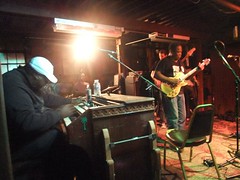
Imagine is a low key super-group featuring Melvin Seals (Jerry Garcia Band), Ray White (Frank Zappa's band), and Garrett Sayers (the Motet). All three of these guys are masterful performers, but the other two players, drummer Daren Hahn and Jamie Mitchell on guitar, held their own in this jam band free for all.
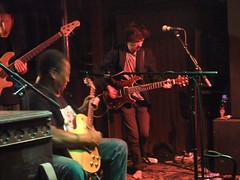
Imagine kicked off their set with a loose, jazzy jam. Seals' organ skittered over the top, while Sayers' bass line laid down a fusion style drive and the drum fills threw in a bit of swing. After a couple of minutes, things took a Zappa-esque turn: a rising intensity dropped away into a more introspective groove and Jamie Mitchell's guitar meandered in counterpoint to the organ comping. Later in the extended exploration, Ray White's skat lines took us back into a jazz blues space.
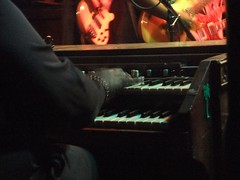
Imagine filled their set with pleasant surprises. The first big one came with what seemed like an unrehearsed cover of Wilco's
War on War. Mitchell quickly called out the changes and the rest of the band dove in. He started off the song fairly close to the original, but the groove started straying as the organ cut loose. The first righteous solo could have a filled a church. From that point, Imagine made the song their own. Melvin Seals' simple joy in playing infused the music with a infectious vibe that had us all reflecting his grin.
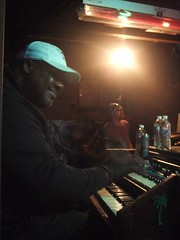
The band skipped all of the typical territorial posturing that super-groups often entail. Seals and White were secure in their experience, with nothing to prove, while the younger guys had the chops to stand up and follow their example. Ray White's self deprecating humor (he spent much of the set sitting down) and warm stage patter kept things light. But he still brought a soulful intensity and youthful energy to his singing.
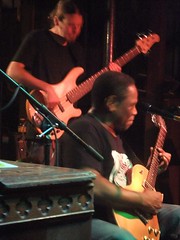
Imagine tripped into more traditional jam band spaces on the Grateful Dead's
Wharf Rat. The easy psychedelic groove flowed smoothly. Sayers captured that Phil Lesh bass style perfectly as Mitchell accented the jam with E-bow driven steel guitar and slide work.
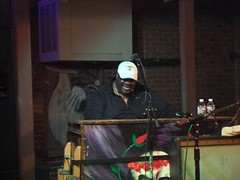
The effortless jam showed off how these guys are incredibly tuned in each other's style, anticipating direction changes. At the same time, they brought their virtuoso skills into play, whether it was Sayers' patented vocally harmonized bass lines or Hahn's behind the beat funk chops on the snare.
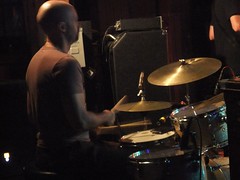
Another wonderful surprise was a cover of Curtis Mayfield's
Pusherman. White's jazzy initial start sounded like an off-the-cuff filler between songs. But then the band kicked in the groove as he finished the first verse, starting a tight soul-funk jam that capped the set.
Unfortunately, I missed Imagine's second set because I couldn't pull myself away from Eric McFadden Trio's burning set.
Eric McFadden Trio

I've seen the
Eric McFadden Trio play for crowds of all sizes, from sparsely attended mid-week nights to hot, sweaty venues packed with people. EMT is always adept at pulling energy from their audience and even creating it themselves if they need to. They always seem to play harder than is humanly possible. While their CDs are full of great music, nothing proves their drive and intensity like a live show. Even though the great room wasn't threatening the fire code limits, the band had critical mass to work with during their extended set (at least two hours, non-stop).

Eric McFadden has racked up countless hours of stage time, touring with bands like P Funk, the Stockholm Syndrome, and Eric Burdon & the Animals. Toss in the myriad gigs playing with his trio and it's easy to see why he's so natural performing. Quixote's main stage gave him more space than some of the smaller clubs he's played, which enforced some distance from the audience. But that just gave McFadden room to stalk and gyrate as the music took him. During his leads, he often deserted the mike to assault the edge of the stage to connect with the crowd and spur them on.
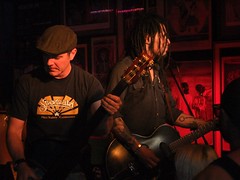
As usual, the chemistry between McFadden and long time bass player, James Whiton, was the centerpiece of the show. The two often stage a head cutting jam, trading licks between Whiton's "upright death machine" and McFadden's overdriven acoustic. With the longer set, they worked that trick repeatedly, each time finding different ways to challenge one another. Paulo Baldi's drum work seemed instinctive as he adapted to each change in the groove.
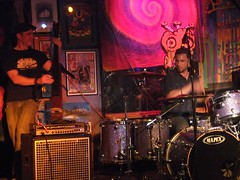
Whiton looked a little tired at times, but never gave any quarter as he treated his electric standup bass like a weapon, spewing percussive strikes, staccato shards of bassline, and swirling howls of bowed strings. Despite looking like controlled chaos, his bass playing always meshed with Baldi's aggressive kick work and McFadden's fluid flail. That is EMT's magic: they fit together like a perfectly tuned hot rod; every tolerance calculated and then pushed.

The band played through a host of their familiar tunes, wrapping up the set with
Miranda, which they always stretch out with side trips in the middle section. This time they used an old favorite,
Baby, Please Don't Go, to extend the song. There were a couple of unfamiliar tunes scattered through the setlist, including at least one from McFadden's latest solo album,
Bluebird On Fire.
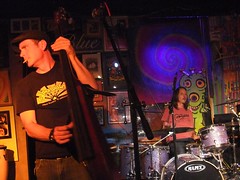
Drummer Wally Ingram sat in as a special guest during
Want Me To from
Delicate Thing, showing off his tight tom playing. Near the end, McFadden brought up another guitarist who's name I didn't catch, but he covered 6-string duties while McFadden wrapped up the song.

Aside from
Baby, Please Don't Go, EMT tossed out a few covers and teasers. The best cover of the night was a tie between Jimi Hendrix's
Voodoo Chile, Slight Return and Miles Davis'
So What. Both songs hit the perfect balance between the original material and EMT's interpretation. The teasers are more of a joke from the band. They'll throw in a small reference to well known songs in the middle of their jams. My favorite was Whiton's foray into the Knack's
My Sharona.
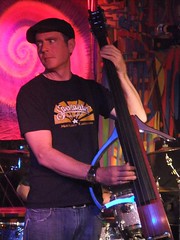
It was a late night of great music. My only regrets were missing Imagine's second set and the parking ticket I got because I didn't feed the meter when Monday rolled around at midnight.

More photos on my
Flickr.
 Sagan Lane pushes duo into duality on a host of levels. On Funambule, Marley Butler and Sarah Bilodeau stretch their tightrope across the chasm between electronic and acoustic, looped structure and ambient accent, and sweet folk ballad and electronic beat. Like most strong art, Sagan Lane is more interested in presentation than resolution. Listeners can decide for themselves which elements are ascendent.
Sagan Lane pushes duo into duality on a host of levels. On Funambule, Marley Butler and Sarah Bilodeau stretch their tightrope across the chasm between electronic and acoustic, looped structure and ambient accent, and sweet folk ballad and electronic beat. Like most strong art, Sagan Lane is more interested in presentation than resolution. Listeners can decide for themselves which elements are ascendent.



























